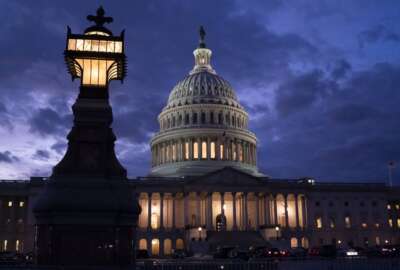Congress looks to next year to take up where it’ll leave off this year
Even Democrats on Capitol Hill are saying the gigantic so called Build Back Better legislation won't happen in 2021. They'll be back with it next year.
Best listening experience is on Chrome, Firefox or Safari. Subscribe to Federal Drive’s daily audio interviews on Apple Podcasts or PodcastOne.
Even Democrats on Capitol Hill are saying the gigantic so called Build Back Better legislation won’t happen in 2021. They’ll be back with it next year. Meantime, members are concerned with how the vaccine mandate is playing out for federal employees and service members. The Federal Drive with Tom Temin got more details from WTOP Capitol Hill correspondent Mitchell Miller.
Interview transcript:
Tom Temin: And Mitchell, then BBB I guess has becomes a new acronym, the new set of letters, but it’s going to be BBB-NY, like next year.
Mitchell Miller: Exactly. You’re gonna have to wait on that holiday gift until the new year. If they get it at all, we’ll have to see what happens. But there was a real push hard by Senate Majority Leader Chuck Schumer to try to get this done before Christmas. He kept reiterating it. And then last week, he started backing off and early in the week, it was becoming clearer and clearer that this is probably not going to happen. And why isn’t it happening? Well, among the many reasons, but probably singularly the most is, of course, West Virginia Sen. Joe Manchin, who has made it very clear to his fellow Democrats that he has a lot of issues with the cost of this program, and what is all included in it. And really, some of the last things that came together or didn’t come together as you if you will, last week was the fact that he just had indicated to at least according to some Democrats, that he was willing to go for a one year extension on the Child Tax Credit, which Democrats have really been touting as a tax cut for many people in the middle class. And he believes that it’s basically a budget gimmick that to say that this is close to $2 trillion, that he really thinks it needs to be explicitly stated to last over a decade. And of course, if you added it in over a decade, it’s going to add $1.6 trillion just alone to the cost of the overall package. So clearly, this is not just a bit of tweaking that has to be done with the Build Back Better Act, but there is going to be a lot of changes, if they’re going to get this passed and get the approval of Joe Manchin.
Tom Temin: And I think some of the federal agencies were hoping for this bill, just because there are millions of goodies here and there for individual efforts such as modernization of Information Technology, which a couple of the other earlier COVID Relief bills had. But that’s Congress’s way of using these vehicles to get things done that are not in the regular appropriations.
Mitchell Miller: Right. There’s a lot of the things like the child tax credit or debate over family leave, those get a lot of attention, but there’s a lot of extra money there. And still, when you go back to the COVID package early in the year, as you indicated, a lot of that is trickled out. I mean, just recently, as one example, going back to that COVID package that was passed earlier in the year in Virginia, state officials, along with members of Congress touted the fact that hundreds of millions of dollars are going toward broadband, that will help a lot of areas, especially rural areas. And kind of a similar principle involved with federal agencies that they know that there’s a lot of cash tucked in the cushions of this massive couch that potentially could be hauled out of Congress and passed, if it ever is. And they could get more money for IT improvements for telework for a whole series of things that they would love to see extra money for.
Tom Temin: Will they be doing anything else on the Hill, then in the few couple remaining weeks they’ve got of the calendar year?
Mitchell Miller: There’s really not much that they can do in terms of legislatively, getting major programs out. The last things that they’ve been doing is trickling through all of these confirmations on judges and various agencies. And there’s, as you know, been a lot of give and take on that. They finally had a little bit of a breakthrough last week where they were able to get some key nominations, the Democrats, through for the Biden administration. But beyond the nominations and things like that, they’re really going to have to move into January. And even the president with his own statement last week indicated that it’s going to be days and more likely weeks, if not months before they really get going on things like Build Back Better. And as we look to the new year, it’s going to be interesting, because as we’ve talked about many times, Congress always needs a deadline. They need to be shoved up against the wall to get things done. And that was kind of what the hope was from Senate Majority Leader Chuck Schumer was that they would get near Christmas and they would just all have to get out of here. And then they would hopefully pass it from the Democrat standpoint, Republicans obviously strongly opposed to this whole package. Now the question is what is going to be that next deadline as we move into 2022? Because there really isn’t a natural deadline. And of course, these deadlines are self-imposed by the Democrats. But again, Congress needs these type of deadlines to get things moving forward. And then as you well know, as we move into 2022, look out, here come the midterm elections. And if you get too deep into 2022, then you really can’t get anything done, from the Biden administration standpoint.
Tom Temin: We’re speaking with Mitchell Miller, Capitol Hill correspondent for WTOP. And the COVID mandate is like a piece of gumby. It gets twisted and turned around and looks up between its own legs. And I mean, it’s really strange what’s going on. But the Congress, or at least some members are interested in how this is playing out in the latter days of the federal workforce and the armed services. And you’ve talked to a couple of members about that. What have you found?
Mitchell Miller: Well, depending on the the member that you talked to, there’s really some concern about the fact that there’s still the lingering number of people that have not been vaccinated. Now, the military overall, as you know, has taken a very aggressive approach on this, and for the most part has done very well. If you look at the Army, for example, roughly 98% of service members have been vaccinated or at least received one dose of the vaccine. The Navy is at a very high rate as well. But that still leaves thousands of Navy personnel, Army personnel who have not been vaccinated, and I was speaking with Tim Kaine and other reporters the other day, and he has some real concerns about even though, for example, in the Navy, it’s about 5,700 personnel who have failed to get shots, that is a significant number if you’re looking at readiness, as he pointed out. And from his standpoint, he just believes that, especially in the Navy, when you look at issues like for example, the carrier [USS] Theodore Roosevelt earlier had a spread of coronavirus, because everybody’s of course, in contained quarters and not to mention a submarine. You can only imagine there. So his point is that, really if you’re in the military, and he has a son that’s in the Marine Corps, or at least now in the reserves, that it’s your responsibility to your fellow service members to get this done. And I think overall, for the most part, the military members of Congress are relatively pleased with the high numbers, but they’re still concerned that there’s still this group of other personnel that are not getting vaccinated, and they are now in the process, for example, with the Army of getting written reprimands. And then eventually, if they continue to say they’re not going to do it, they will likely be separated. By the way, in connection with that, as part of the defense legislation that was passed last week, there was a provision put in that would prohibit the service branches from dishonorably discharging someone who refuse to get the coronavirus vaccine. This was pushed by Republican members in the House and Senate who felt that it would be unfair to people who did not want to get vaccinated. Also, one last note related to the military. While many military personnel have applied for the religious exemption, at least at this point, none of them have received it.
Tom Temin: Right, yes, they’re reluctant on that. Because maybe the opportunity for some strange applications to come in under that umbrella.
Mitchell Miller: Right.
Tom Temin: And you mentioned 5,700, Navy personnel. It doesn’t sound like a big number in the context of a organization as large as the Navy, but 5,700 people, that’s the population of a carrier, a destroyer and half dozen submarines.
Mitchell Miller: Exactly. And that was the question he was getting from one of the reporters down in Norfolk where I used to work. And, he pointed out, hey, look, if you don’t have enough people, like on an amphib[ious] ship for support for the carrier group, that’s a real problem. And let’s face it, the military is all about readiness. So that is really one of the ongoing concerns for people like Sen. Tim Kaine, who’s on the Armed Services Committee, and others who deal with these type of issues.
Tom Temin: And on the civilian side, it’s still pretty much again over for the most part, but it’s not a clean turn off.
Mitchell Miller: Right. So federal employees, for the most part, the majority of roughly 3.5 million employees have been fully vaccinated. But there are a lot of people who still have not and as we’ve been talking about over the last few months, the Biden administration continuing to try to push them, nudge them, get everybody, as many as they can fully vaccinated. But over the last couple of months, we had that kind of pause, if you will, allowing the federal agencies to hold off. So as we again look toward January, it’s going to be interesting to see how quickly these agencies move to actually force employees out if they’ve continued to refuse to get vaccinated. Many federal agencies, as you’re aware, have taken that gradual approach giving people chances to explain the reasons again for religious or medical rationale for not getting vaccinated. So I’m curious to see how hard they’re going to push as we get into the new year.
Tom Temin: Mitchell Miller is Capitol Hill correspondent for WTOP. Thanks so much.
Mitchell Miller: You bet.
Copyright © 2025 Federal News Network. All rights reserved. This website is not intended for users located within the European Economic Area.
Tom Temin is host of the Federal Drive and has been providing insight on federal technology and management issues for more than 30 years.
Follow @tteminWFED






